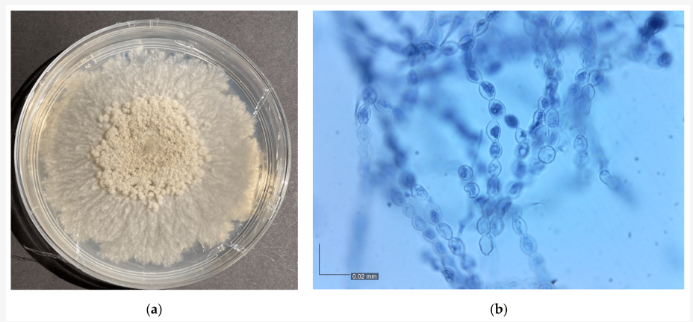Another article made in CULTIVAR: Identification and morphological, molecular and genomic characterization of Monilinia fructicola in Prunus persica from Portugal.
This study was developed within the scope of the CULTIVAR project and the PhD in Biosciences of Elsa Baltazar and involved researchers from the Pedro Nunes Institute, CATAA – Centre for Agro-Food Technological Support and the Centre for Functional Ecology – Science for People & the Planet of the University of Coimbra and describes, for the first time, the detection of the regulated organism Monilinia fruticola in Prunus persica in the region of Cova da Beira, Portugal.
The results are recently published in the international scientific journal Agronomy (https://www.mdpi.com/2073-4395/13/6/1493).
In the last two years, the peach orchards of the Cova da Beira region have registered a progressive decline of the plants, with symptoms characterized by floral abortion with production of exudates, cancers in the branches and, in some cases, death of the plants. This situation has resulted in significant losses for producers in the affected orchards. Given this scenario, procedures were established to identify the causal agent responsible for the observed decline, and M. fructicola was detected for the first time in Portugal in P. persica.
This regulated organism was detected and confirmed in nine of the forty-six samples analyzed (flowers and branches), corresponding to four of the thirteen orchards sampled, all located in the northern region of Cova da Beira. These results suggest that the distribution of the disease is still limited in the region studied, being restricted to geographically close orchards, all located north of the Serra da Gardunha. However, it was possible to observe the spread of symptoms associated with the disease within the orchards over the two years of the study, as well as an increase in the severity of these symptoms in the infected plants over time.
Stone fruits such as sweet cherry, peach and nectarine are economically important for the fruit sector Portuguese. The presence of M. fructicola described in this work will certainly affect the national production of peach and nectarine in the coming years, since Cova da Beira is the main production zone. However, this evidence will contribute decisively to raising the awareness of plant health authorities and producers of the presence of a regulated and harmful organism, allowing the implementation of specific phytosanitary management measures aimed at limiting the spread of the disease within the orchard and between orchards, thus reducing its impact on the productivity of the sector.
The work was carried out by the CULTIVAR project team, consisting of researchers Elsa Baltazar, Sara Rodrigues, Aitana Ares, Alexandra Camelo, Inês Brandão, Christophe Espirito Santo, João Trovão, Eva Garcia and Joana Costa.
The funding of the project was in charge of the Foundation for Science and Technology and the European Fund for Regional Development, through the Regional Operational Programme Centre 2020 (Centro2030), Portugal 2020 and the European Union.




